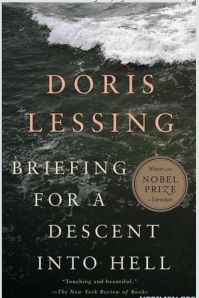 There are very few of Doris Lessing’s books I haven’t read.
There are very few of Doris Lessing’s books I haven’t read.
If I had not read The Golden Notebook, I might have become a different person.
Lessing’s brilliant depiction of the character Anna Wulf’s ironic stance toward politics, sex, and her lovers’ misogyny reflected not only her own generation’s struggles, but a later generation’s (mine). Anna Wulf keeps notebooks–different notebooks for different parts of her life–and everything coheres in the golden notebook, a special notebook, a gift. ( I am still waiting for my golden notebook: I hardly think it is my blog.)
But when her novel, Briefing for a Descent into Hell, was published in 1971, I wasn’t interested.
The format put me off. After the copyright page, there is a double-page spread with delicate elliptical swirls drawn around a black filled-in circle. It says inside the inner ring and moving the circle:
CATEGORY: INNER-SPACE FICTION
For there is never anywhere to go but in.
This experimental novel interweaves documents in a psychiatric hospital, a patient’s alternate-universe memories, letters from his wife and friends, two doctors’ different ideas about treatment (and the treatment that turns out to be a terrible idea), and dialogue between the patient and the doctors.
Four decades later, I have finally read this powerful novel. As in The Four-Gated City, Lessing explores the idea that not all mad people are mad.
In an interview with Joyce Carol Oates about Briefing in The Southern Review in 1973, Doris Lessing spoke of attitudes toward madness she shared with R. D. Laing:
Yes. We were both exploring the phenomenon of the unclassifiable experience, the psychological ‘breaking-through’ that the conventional world judges as mad. I think Laing must have been very courageous, to question the basic assumptions of his profession from the inside…. In America, the psychiatrist Thomas Szasz, in The Manufacture of Madness, has made similar claims. He has taken a very revolutionary position.
The hero of Briefing, Charles, a classics professor, has amnesia, but his experiences while mad have been the true experiences of his life. During a shipwreck, his friend are swept up by a crystal disc. He spends days on a raft, and finally lands near a beautiful ruined city. In the central square, he sweeps away leaves and cleans it, believing that a crystal that swept up his friends one by one on a ship will come for him.
When I woke, as the sun came up shining from the blue-green sea, I knew quite clearly that I had something to do. My friends were all about me. I knew that, and in some way they were of the substance of this warm earthy stone, and the air itself, but it was not enough for me just to live here and breathe in air. I sprang straight up when I woke, driven by this knowledge that I had work to do, and went to wash my face and hands in the nearest water channel…. I… walked out among the sky-roofed houses to see what I could see… it was very strange indeed that I had not noticed this before: among the buildings, in what seemed like the center of the old city, what might very well have been the former central square, was an expanse of smooth stone which was not interrupted by flowers or by water channels. The square was perhaps seventy or a hundred yards across, and in it was an inner circle, about fifty yards across. It was a little cracked where earth had settled under it, and some grass grew in the cracks, but it was nearly flat, and it waited there for what I had to do. I knew now what this was. I had to prepare this circle lying in its square, by clearing away all the loose dirt and pulling out the grass.
When the disc finally comes, he is able to see an ideal city within a city. But he is sent back to earth.
There is so much in this narrative: the evolution of terrifying animals in the city who are similar to human beings; and later a meeting on another planet with the gods, who send envoys to Earth to prepare the people for a terrible catastrophe. On earth they will be born, forget their mission, and, if they are lucky, remember it someday.
We understand Charles’ birth.
At a lecture he influences some other people who are trying to remember, though he does not himself remember.
It is very moving.
This is a character who should not be subjected to psychiatric treatment.
I must reread this to see exactly what Lessing means, if there are any doubts about the character (not that I think there are), and if there is any other way to interpret this. I think not.
Briefing reminds me a bit of some of the science fiction of David Lindsay (Voyage to Arcturus) and Anna Kavan (Ice). It was nominated for the Booker Prize.
Lessing was unorthodox, brilliant, and brave.
As for madness? Often the mad are brilliant. Often the mad are in terrible pain. The psychiatric drugs are always inadequate, though perhaps better than they used to be. A friend told me that Clozapine had changed his life for the better. I have other friends who have struggled with antidepressants, unable to endure the side effects. Very little money is spent on research for these drugs. The mentally ill are throwaway people.
It’s a sad world, and Lessing knew about it.

I’ve yet to discover Lessing’s sci fi but it does sound very wonderful – the sort of sci fi I like, not space troops fighting it out with big guns!
LikeLike
Yes, hers is very sophisticated sci-fi. She wrote quite a lot of it. No space troops, thank God–I know exactly what you mean!
LikeLike
Haven’t read this one, but loved Mara and Dann. Her SF is great.
LikeLike